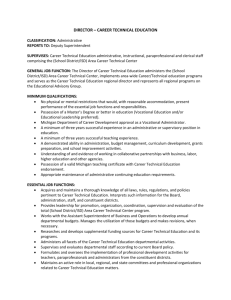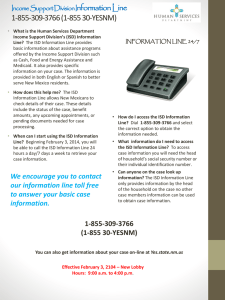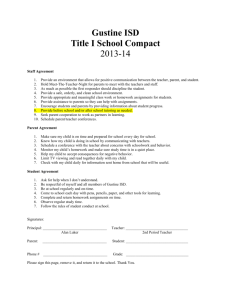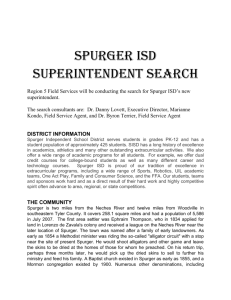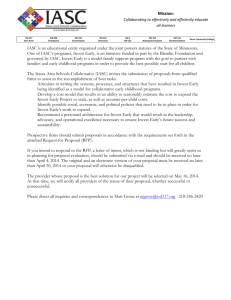Administrator Academy
advertisement
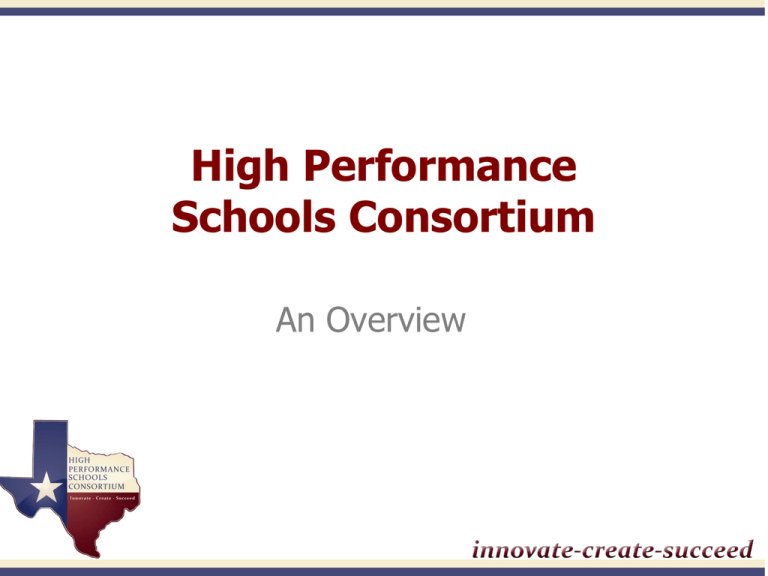
High Performance Schools Consortium An Overview The Consortium • Established by 82nd Legislature, Senate Bill 1557 • Methods for transforming public schools – Digital Learning – High Performance Learning Standards – Multiple Assessments – Community-Based Accountability • Districts selected based on application Consortium Districts • 23 participating districts • Diversity among districts, campuses, students and communities – Districts as small as 105 students – Districts as large as 52,000 students – Rural, suburban and urban areas – Representative of Texas demographics Consortium Districts School District County Enrollment Anderson-Shiro CISD Grimes 725 Clear Creek ISD Galveston 39,209 College Station ISD Brazos 10,805 Coppell ISD Dallas 10,676 Duncanville ISD Dallas 13,079 Eanes ISD Travis 7,803 Glen Rose ISD Somerville 1,627 Guthrie Common ISD King 105 Harlingen CISD Cameron 18,605 Highland Park ISD Dallas 6,804 Irving ISD Dallas 34,770 Harris 46,002 Klein ISD (selected schools) Consortium Districts School District County Enrollment Lake Travis ISD Travis 7,412 Lancaster ISD Dallas 6,164 Lewisville ISD Denton 51,920 McAllen ISD Hidalgo 25,252 McKinney ISD Collin 24,733 Northwest ISD Denton 16,626 Prosper ISD Collin 4,847 Richardson ISD Dallas 37,044 Roscoe ISD Nolan 367 Round Rock ISD Williamson 45,034 White Oak ISD Gregg 1,449 Purpose of the Consortium • Transform public schools by developing an assessment and accountability system that: – Is not over-reliant on high-stakes tests – Considers needs of the local community • Improve K-12 student learning – Empower students to innovate, collaborate, communicate, create, synthesize, analyze and problem-solve The Call for Change • Reduce the number of tests and the highstakes nature of tests • Adopt high-priority learning standards • Integrate technology into student learning The Call for Change Our current accountability system: • penalizes districts with a diverse student population; • rates schools on its lowest scores rather than the overall performance; • fails to honor local control; and • ignores future-ready learning skills needed for success. Future-Ready Learning Skills To be competitive in a global workforce environment, our students must be able to: •Innovate •Create •Think Critically •Collaborate •Communicate •Problem solve •Act ethically •Leverage technology Vision of a K-12 Classroom • Relevant and engaging instructional environments • Critical thinking and problem solving are the norm • High-Priority Learning Standards grounded in future-ready skills • Academically rigorous • Digital citizenship Consortium Pathway • Develop high-priority learning standards, assessments and accountability systems • Follow Consortium’s Guiding Principles: – Digital learning – Learning standards – Multiple assessments – Local control Shared Vision Our work aligns to other transformational initiatives: • Visioning Institute • Resolution against High-Stakes Testing – Adopted by 86% of school boards in TX – Adopted by Texas parent and teacher organizations – Adopted by a number of chambers, city councils and organizations across the state Legislation • HB 2824 – Filed by Rep. Bennett Ratliff from District 115 – Representative Ratliff is a former school board member in Coppell ISD – This bill amends current law to facilitate the Consortium’s development of innovative, next-generation high priority learning standards and assessment and accountability systems Ongoing Work of Consortium • Implemented in phases over the next several years • Deadline of January 1, 2018
